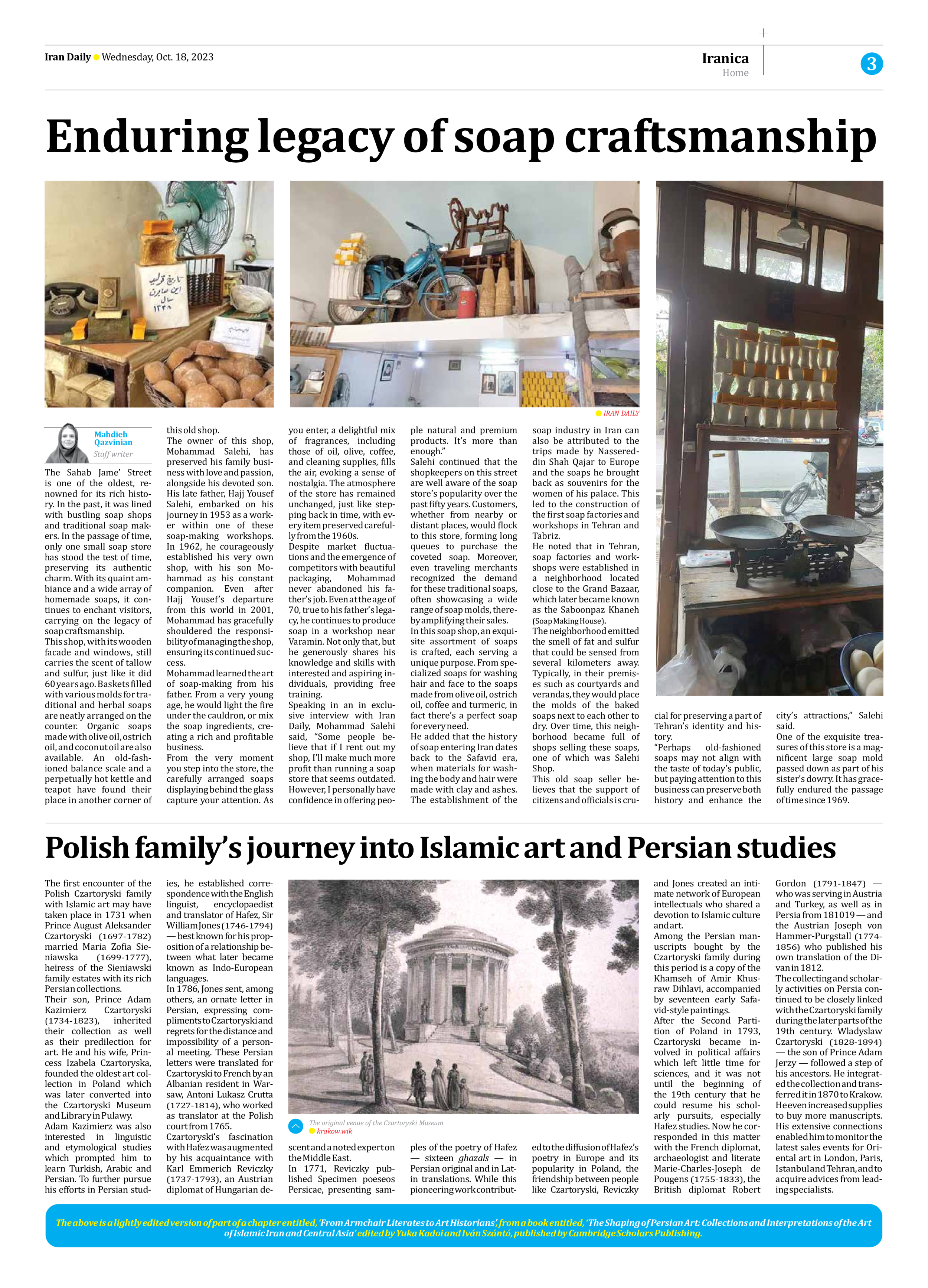
Enduring legacy of soap craftsmanship
Mahdieh Qazvinian
Staff writer
The Sahab Jame’ Street is one of the oldest, renowned for its rich history. In the past, it was lined with bustling soap shops and traditional soap makers. In the passage of time, only one small soap store has stood the test of time, preserving its authentic charm. With its quaint ambiance and a wide array of homemade soaps, it continues to enchant visitors, carrying on the legacy of soap craftsmanship.
This shop, with its wooden facade and windows, still carries the scent of tallow and sulfur, just like it did 60 years ago. Baskets filled with various molds for traditional and herbal soaps are neatly arranged on the counter. Organic soaps made with olive oil, ostrich oil, and coconut oil are also available. An old-fashioned balance scale and a perpetually hot kettle and teapot have found their place in another corner of this old shop.
The owner of this shop, Mohammad Salehi, has preserved his family business with love and passion, alongside his devoted son. His late father, Hajj Yousef Salehi, embarked on his journey in 1953 as a worker within one of these soap-making workshops. In 1962, he courageously established his very own shop, with his son Mohammad as his constant companion. Even after Hajj Yousef’s departure from this world in 2001, Mohammad has gracefully shouldered the responsibility of managing the shop, ensuring its continued success.
Mohammad learned the art of soap-making from his father. From a very young age, he would light the fire under the cauldron, or mix the soap ingredients, creating a rich and profitable business.
From the very moment you step into the store, the carefully arranged soaps displaying behind the glass capture your attention. As you enter, a delightful mix of fragrances, including those of oil, olive, coffee, and cleaning supplies, fills the air, evoking a sense of nostalgia. The atmosphere of the store has remained unchanged, just like stepping back in time, with every item preserved carefully from the 1960s.
Despite market fluctuations and the emergence of competitors with beautiful packaging, Mohammad never abandoned his father’s job. Even at the age of 70, true to his father’s legacy, he continues to produce soap in a workshop near Varamin. Not only that, but he generously shares his knowledge and skills with interested and aspiring individuals, providing free training.
Speaking in an in exclusive interview with Iran Daily, Mohammad Salehi said, “Some people believe that if I rent out my shop, I’ll make much more profit than running a soap store that seems outdated. However, I personally have confidence in offering people natural and premium products. It’s more than enough.”
Salehi continued that the shopkeepers on this street are well aware of the soap store’s popularity over the past fifty years. Customers, whether from nearby or distant places, would flock to this store, forming long queues to purchase the coveted soap. Moreover, even traveling merchants recognized the demand for these traditional soaps, often showcasing a wide range of soap molds, thereby amplifying their sales.
In this soap shop, an exquisite assortment of soaps is crafted, each serving a unique purpose. From specialized soaps for washing hair and face to the soaps made from olive oil, ostrich oil, coffee and turmeric, in fact there’s a perfect soap for every need.
He added that the history of soap entering Iran dates back to the Safavid era, when materials for washing the body and hair were made with clay and ashes. The establishment of the soap industry in Iran can also be attributed to the trips made by Nassereddin Shah Qajar to Europe and the soaps he brought back as souvenirs for the women of his palace. This led to the construction of the first soap factories and workshops in Tehran and Tabriz.
He noted that in Tehran, soap factories and workshops were established in a neighborhood located close to the Grand Bazaar, which later became known as the Saboonpaz Khaneh (Soap Making House).
The neighborhood emitted the smell of fat and sulfur that could be sensed from several kilometers away. Typically, in their premises such as courtyards and verandas, they would place the molds of the baked soaps next to each other to dry. Over time, this neighborhood became full of shops selling these soaps, one of which was Salehi Shop.
This old soap seller believes that the support of citizens and officials is crucial for preserving a part of Tehran’s identity and history.
“Perhaps old-fashioned soaps may not align with the taste of today’s public, but paying attention to this business can preserve both history and enhance the city’s attractions,” Salehi said.
One of the exquisite treasures of this store is a magnificent large soap mold passed down as part of his sister’s dowry. It has gracefully endured the passage of time since 1969.







